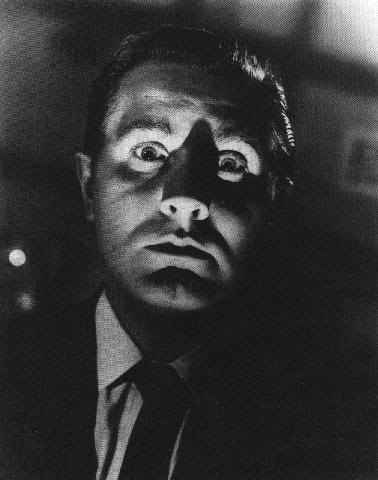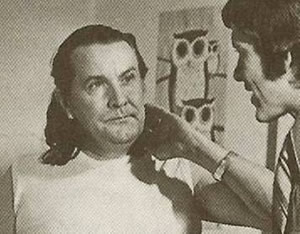 After Tim Burton’s movie ‘Ed Wood’ was released in 1994, people were suddenly talking about this cult director who had a fetish for angora, sometimes wore miniskirts in public and had been called the “worst director of all time” for such epics as ‘Glen and Glenda’, ‘Plan 9 from Outer Space’ and ‘Bride of the Monster’. It was only after the movie came out that I began to wonder if this was the same man I’d worked with in Los Angeles more than two decades earlier. Over the years I’d often told stories of ‘this old drunk’ who wore mini-skirts and angora sweaters and say he’d worked with Bela Lugosi’ but it was just party-chatter and I never even remembered his name. Only when the ‘Ed Wood’ movie came out did I wonder: “Could this be the same guy?” After I tracked down Rudolph Grey’s book ‘Nightmare of Ecstasy: The Life and Art of Edward Wood Jr.’, I was amazed to see the time we worked together at an “adult” publishing house called Pendulum so well documented
After Tim Burton’s movie ‘Ed Wood’ was released in 1994, people were suddenly talking about this cult director who had a fetish for angora, sometimes wore miniskirts in public and had been called the “worst director of all time” for such epics as ‘Glen and Glenda’, ‘Plan 9 from Outer Space’ and ‘Bride of the Monster’. It was only after the movie came out that I began to wonder if this was the same man I’d worked with in Los Angeles more than two decades earlier. Over the years I’d often told stories of ‘this old drunk’ who wore mini-skirts and angora sweaters and say he’d worked with Bela Lugosi’ but it was just party-chatter and I never even remembered his name. Only when the ‘Ed Wood’ movie came out did I wonder: “Could this be the same guy?” After I tracked down Rudolph Grey’s book ‘Nightmare of Ecstasy: The Life and Art of Edward Wood Jr.’, I was amazed to see the time we worked together at an “adult” publishing house called Pendulum so well documented
My period at Pendulum (I think its official business name at the time was Calga Publishers, although many of the magazines came out under the Pendulum title) was one of those strange periods one falls into when young and wandering the world. I’d left the UK in 1969 for Mexico and lived there until my money ran out, then hitch-hiked to Los Angeles in 1970 flat broke with just a couple of phone numbers for people I’d met in Mexico. One was a writer who wrote books for Bernie Bloom, the owner of Pendulum Publishing. Knowing I needed a job, my friend introduced us. Bernie asked if I knew how to edit magazines (I didn’t but of course said I did) and he hired me. For a green kid new to America, working for Pendulum was like Alice having falling down the rabbit hole.
Ed Wood was one of four writers Bernie employed at that time to write copy for the range of adult magazines Pendulum put out each month. Ed was at least twenty years older than the rest of us; a big gap when one’s in one’s twenties. We “young Turks’ (as we called ourselves) saw Pendulum as only a stepping stone to fame and fortune as “real” writers but Ed seemed to be there for the duration. I find it strange to realize he was only in his mid forties at the time, although the booze was already taking its toll. He had a reputation for being a mean drunk but I remember him as kind and gentle. He’d always help out when one of the younger writers was stuck on a story or article.
There were many different magazine titles in use at that time; the soft-core and hard-core magazines coming under different names. The four of us had a range of writing duties, creating the ‘case studies’ that went with the picture layouts as well as one or more articles and a piece of fiction per magazine. Since nobody cared (readers bought the magazines for the pictures), we’d have fun with them. I was into Sci-Fi at the time so I wrote a lot of straight Sci-Fi short stories; totally out of keeping with the magazines but nobody ever complained.

Ed Wood directing “Necromania” in 1971
I’d been told police raids were a regular occurrence but I remember only one during my time at Pendulum. Coming in the main entrance from Pico Boulevard, there was a small vestibule with a window/hatch through which one could talk to the receptionist. A door with an electric lock closing off the rest of the building could only be opened when the receptionist tripped the switch. On the police raid I experienced, they refused to wait until the receptionist opened the door, instead climbing in through the hatch and scaring everyone in the front office. We all kept our heads down in the back and tried to ignore the shouting and banging.
What do I remember most about Ed Wood? The tragedy is, not nearly enough. Yes, he sometimes wore miniskirts around the office and he often wore his trademark angora sweaters. He was certainly the first transvestite I’d ever met. But we never took him seriously. We liked him well enough but he was a figure of fun, just a washed up old drunk. While he talked about the movies he’d made, and about working with Bela Lugosi, I’m ashamed to say I didn’t really believe him. Youth can be very cruel. Ed seldom joined us out in the corridor for our push-pin tournaments; he’d just write away in his tiny windowless office. I suspect he disapproved of the lack of seriousness with which we took our job. He certainly disapproved of our attitude towards the books that Bernie expected us to write outside office hours. In addition to the princely sum of $200 a week I was paid as a Pendulum staff writer, we were all encouraged to write a book a month in our spare time, for which we were paid an additional $800-$1000. While the books could be fiction, what Bernie really wanted was pseudo-scientific factual books that could be illustrated with hard-core pictures.
We used pseudonyms on all the books and magazines and it’s been said that Dr. T. K. Peters was one of Ed Wood’s. But this poor man really existed. Pendulum had bought a serious, boring and excruciatingly long scientific study of sexuality from Dr. T. K. Peters. It was an unpublished manuscript that the doctor had probably labored on for years without finding a buyer (he was a Kinsey-style researcher). I hate to think what he was paid – probably peanuts – but he was very old (semi-senile was the word around the office) and he’d let it go without realizing what use would be made of it. The manuscript gave Bernie a sort of ‘semi-legitimacy’ for the books and magazine articles and we were all encouraged to make use of it whenever and wherever possible. Adding Dr. Peter’s name as co-writer added a spurious legitimacy.
While we liked the extra money from writing the books, none of us (except maybe Ed) liked the idea of spending our free time writing them, especially since people only bought them for the pictures. Before I joined Pendulum, the younger writers had developed a unique short-cut, dipping into the files for magazine articles that had been written a year or more before, collecting seven or eight together, then rewriting the first paragraph of each to fit a new generic title. Such a “new” manuscript was then sent straight down to typesetting. I think the record for ‘writing’ a ‘new’ non-fiction book was an hour. Eight hundred bucks is certainly good pay for an hour’s work! Ed used to disapprove strongly and always wrote his manuscripts completely, although he too culled heavily from the T. K. Peters material. Apparently the scam was discovered some months after I’d left Pendulum and at least one of my fellow writers was fired.
Leo Eaton was a staff writer for Pendulum Publishers in 1970/71
Because I’d been in the British film industry before coming to America, Ed clearly found me more of a kindred spirit than my other colleagues, once even taking me shopping with him. He needed a new bra and what surprised me most was that the sales girl was totally un-phased as he tried on a variety of different colors and shapes. I guess Los Angeles sales girls in 1970 were far more used to transvestites than I was. We tended not to socialize much outside the office, although the four of us went to lunch several days a week (there was a little dive just up the road on Pico that had the best Spanish hot dogs I’ve ever tasted) and sometimes met for a drink in the evening. But before I left Los Angeles to return to Mexico (working at Pendulum had restocked my depleted finances), Ed invited me home for dinner. I remember little about the evening except my surprise that Kathy, his wife, was so nice and normal
I left Pendulum and for many years afterwards the old guy who wore miniskirts and angora sweaters and made films with Bela Lugosi was a cocktail-party story, even though I couldn’t remember his name. After Tim Burton’s film was released, everyone knew his name and I find myself regretting all those wasted opportunities. I wish I’d been kinder, wish I’d spent more time with him, wish I’d asked the questions that, in hindsight, we would all like to ask Ed Wood Jr. I’m reminded of a quote from a Hollywood producer in the introduction to Rudolph Grey’s book, ‘Nightmare of Ecstasy’. “The really funny thing is that here is this alcoholic, this old bum that I really liked, and all the time I never knew that he was something special.”


